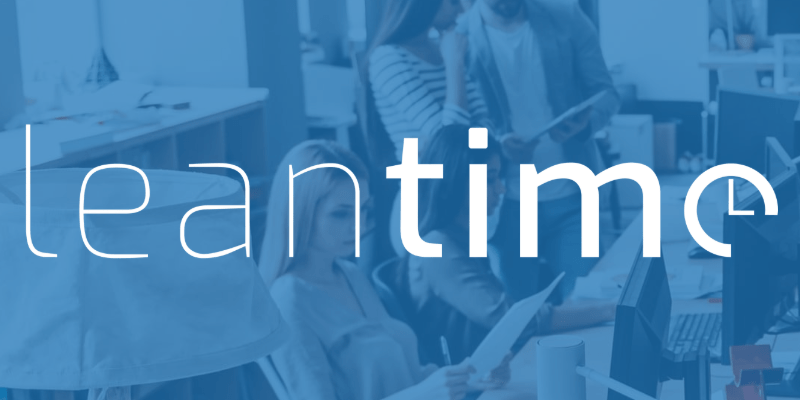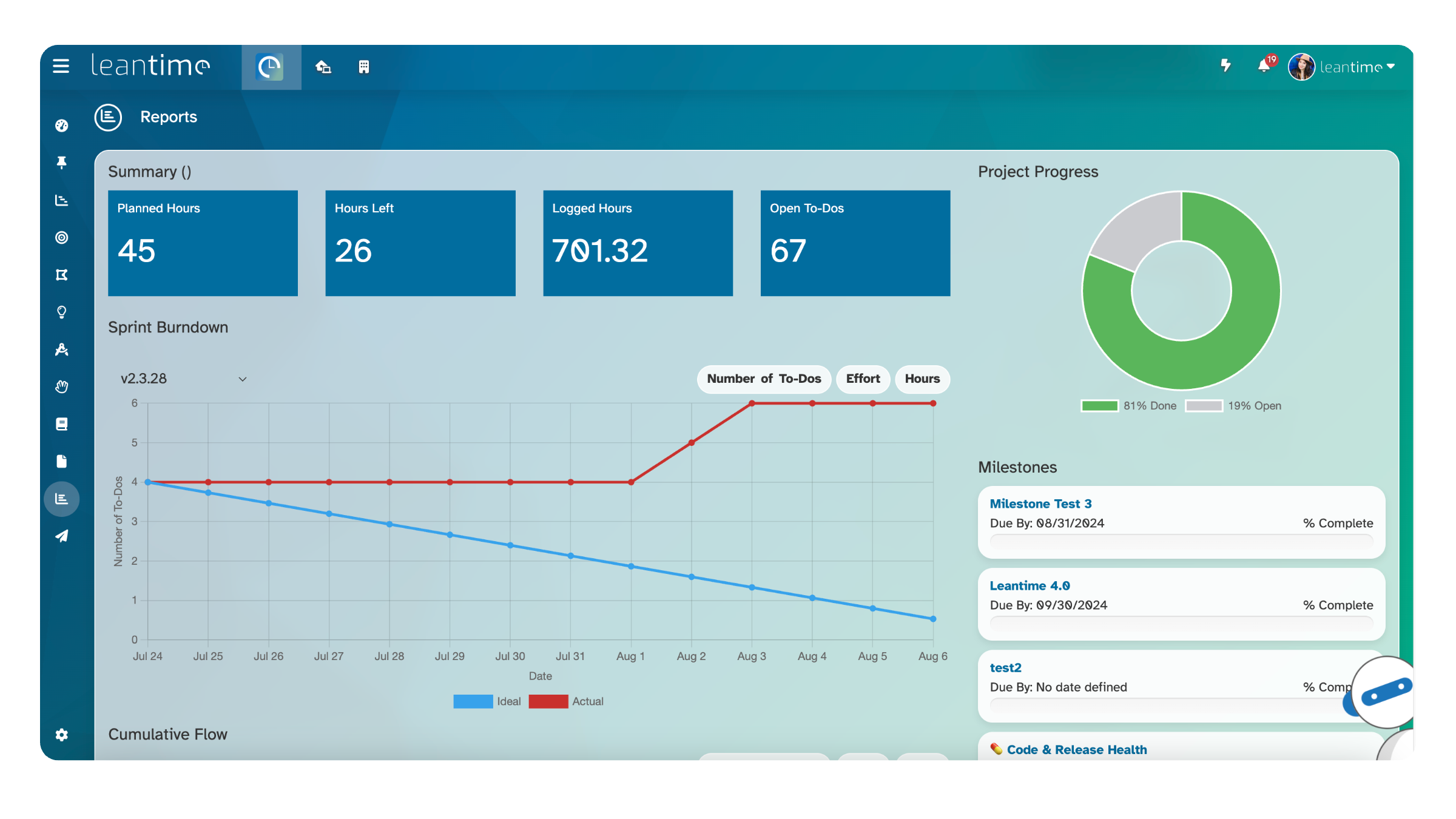
Deploy Leantime [Updated Feb ’26]
Leantime [Feb ’26] (PM | Jira, Trello & Asana alternative) Self Host
docker-leantime
Just deployed
/data
MySQL
Just deployed
/var/lib/mysql
Redis
Just deployed
/data

Deploy and Host Managed Leantime Service with one click on Railway
Leantime is a free, open-source project management tool available on GitHub. Designed for startups, small businesses, and enterprises, it offers a modern mix of project planning, time tracking, collaboration, and Kanban boards. With Leantime, teams can move beyond simple to-do lists and enjoy structured workflows, strategic roadmaps, and lightweight project tracking.
Being open-source, Leantime gives you full flexibility and transparency. You can review its source code on the official Leantime GitHub repository, customize it for your needs, and even contribute to its growing ecosystem.
About Hosting Leantime on Railway (Self Hosting Leantime on Railway)
You can self host Leantime to keep your entire project management environment under your control, with zero reliance on third parties. With Leantime open source software, you benefit from complete data ownership, a powerful Kanban system, and flexible integrations that fit your unique workflow.
Thanks to Railway, you can deploy Leantime instantly in managed Docker containers. This eliminates the complexity of setting up servers manually. Railway automates updates, scaling, and environment management, making hosting Leantime Docker deployments seamless and secure.
Why Deploy Managed Leantime Service on Railway
Deploying a managed Leantime service on Railway gives you:
- Effortless setup – Just one click to deploy.
- Automated scaling – Perfect for teams of all sizes.
- Simplified maintenance – No sysadmin required.
- Security & reliability – Built-in isolation and resilience.
Railway vs DigitalOcean
DigitalOcean requires you to configure Docker images, databases, and networking manually. With Railway, you can Leantime install in minutes, without sysadmin overhead.
Railway vs Linode
Linode offers raw infrastructure, but you must patch servers and monitor uptime. Railway automates container updates, handles scaling, and makes it easy to self host Leantime with fewer technical hurdles.
Railway vs Vultr
On Vultr, you’ll be dealing with firewall rules, disk management, and backups. Railway abstracts all of this, you just focus on using the Leantime app.
Railway vs AWS Lightsail
Lightsail is powerful but involves complex networking and scaling setup. Railway offers click-to-deploy Leantime, optimized for startups and teams who want to get productive quickly.
Railway vs Hetzner
Hetzner is cost-effective but demands detailed server administration. Railway removes these burdens while still being budget-friendly, letting you deploy Leantime GitHub builds securely and rapidly.

Common Use Cases for Leantime
Here are 5 common use cases where Leantime excels:
- Startup Roadmaps – Plan milestones, manage pivots, and keep stakeholders aligned.
- Agile Kanban Boards – Visualize tasks and progress with Leantime Kanban.
- Time Tracking – Log hours directly into tasks and generate timesheets.
- Research & Idea Boards – Capture brainstorming sessions and organize them into actionable tasks.
- Multi-project Management – Manage several projects simultaneously while keeping team productivity high.
Dependencies for Leantime hosted on Railway
Leantime typically needs:
- A PHP runtime (7.4+).
- MySQL or MariaDB database.
- A web server such as Nginx or Apache.
- Docker support (handled automatically on Railway).
Deployment Dependencies for Managed Leantime Service
Railway provisions the PHP runtime, database, and storage for you automatically. You only need to set environment variables (like DB_HOST, DB_USER, DB_PASS, and DB_NAME) when deploying.
Implementation Details for Leantime
When deploying Leantime Docker, you’ll connect your Railway app to a managed MySQL instance. This database stores all projects, tasks, and time entries securely.
How does Leantime compare to other Project Management Platforms? (Alternatives to Leantime)
Leantime vs Trello
Leantime includes roadmaps, timesheets, and research boards, going beyond Trello’s lightweight Kanban features. Trello is best for small personal projects or very simple team workflows, while Leantime is better suited for startups and growing businesses that need strategic planning plus execution tools.
Leantime vs Jira
Jira is powerful but complex and expensive. Leantime open source offers similar Agile workflows in a lightweight, self-hosted package. Jira integrates well with Atlassian tools but has a steep learning curve; Leantime focuses on usability, so non-technical users can adopt it quickly.
Leantime vs Asana
Asana is SaaS-based and requires recurring payments. Leantime self hosted deployments let you avoid vendor lock-in while enjoying comparable project tracking features. Asana excels in integrations and polished UX, but Leantime gives you data control and lower long-term costs.
Leantime vs Taiga
Both are open-source, but Leantime’s emphasis on simplicity, strategic planning, and time tracking makes it especially suited for startups. Taiga focuses more on Agile sprints and backlog management; Leantime adds research boards and time logs for broader business use cases.
Leantime vs ClickUp
ClickUp is a feature-rich SaaS tool offering docs, whiteboards, and dashboards. However, it’s proprietary and can become costly as teams scale. Leantime is lighter, easier to self host, and avoids the subscription creep that ClickUp often brings with advanced features locked behind higher tiers.
Leantime vs Monday.com
Monday.com is known for its visually appealing dashboards and templates, but it comes at a premium cost and locks you into their ecosystem. Leantime provides similar Kanban-style task management and roadmap planning at zero license cost if you self host.
Leantime vs Notion
Notion is a flexible workspace tool with notes, docs, and light project management. However, it lacks built-in time tracking and true Agile features. Leantime focuses on structured project management while still offering lightweight research boards, making it a better choice for startups that need execution plus planning.
How to use Leantime?
- Deploy via Docker or one-click Railway deployment.
- Complete setup through the Leantime install wizard.
- Log into the Leantime app (your own hosted dashboard).
- Create projects, tasks, and Kanban boards.
- Track time, collaborate, and generate reports.
How to self host Leantime on other VPS?
If you prefer to run Leantime manually:
-
Clone the Repository Get the official Leantime code from Leantime GitHub.
-
Install Dependencies Ensure PHP, MySQL/MariaDB, and Nginx/Apache are installed.
-
Configure Environment Variables Example:
DB_HOST=localhost DB_USER=leantime_user DB_PASS=securepassword DB_NAME=leantime -
Run Docker Build the Leantime Docker container and link it to your database.
-
Access the Dashboard Open your VPS URL in a browser to complete setup.
With Railway, you skip all these steps. Just click Deploy Now, and you’re running in minutes.
Features of Leantime
- Kanban Boards for agile task management.
- Roadmaps & Milestones to track long-term goals.
- Idea & Research Boards to capture team brainstorming.
- Time Tracking & Timesheets for projects and billing.
- Simple UI built for non-technical users.
- Multi-project support to handle different clients or internal teams.
- Leantime API for integrations with external tools.
Official Pricing of Leantime
Leantime is free and open-source. However, the team offers cloud hosting plans with premium support:
- Starter: $4/user/month.
- Business: $8/user/month.
- Enterprise: Custom pricing.
If you choose self hosting Leantime, you pay nothing beyond hosting costs.
Self hosting Leantime vs Paid Cloud Plans
- Self host Leantime: Free, complete control, customizable, but requires you to manage infrastructure.
- Leantime Cloud Plans: Paid, come with automatic updates, support, and hosting handled for you.
Monthly Cost of Self hosting Leantime on Railway
Hosting Leantime Docker on Railway usually costs $5–$10/month for the core instance. Add a managed MySQL service and storage depending on your team size. Still far cheaper than SaaS subscriptions.
FAQs
What is Leantime?
Leantime is an open-source project management system with Kanban, roadmaps, and time tracking.
How do I self host Leantime?
You can deploy Leantime using Docker on your VPS or click “Deploy Now” on Railway for one-click hosting.
What are the key features of Leantime?
Features include Kanban boards, time tracking, idea boards, milestones, and multi-project management.
How do I deploy Leantime on Railway?
Choose the Leantime Docker template, set environment variables, and Railway handles the rest.
Is Leantime free?
Yes. Leantime open source is completely free to use, with optional paid hosting plans.
What is the difference between self hosting Leantime and paid cloud plans?
Self hosting gives you complete control and no recurring license costs. Paid plans give you managed updates and official support.
Where can I find Leantime documentation?
The official Leantime documentation is available at docs.leantime.io.
Deploy Now with One Click on Railway and start managing projects.
Template Content
